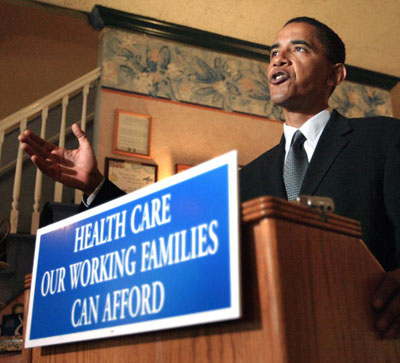Obama’s healthcare bill scrapes through
Much bioethics debate Dominating
Dominating
all bioethics discussions this week was the passage of President Obama’s
healthcare bill. Although everyone agrees that American healthcare needs to be
fixed, a chasm separated Democrats and Republicans, progressives and
conservatives, pro-life and pro-choice, over whether the 2,300 page bill will
do the job.
Those
whose focus was universal medical cover were delighted. “It’s a fundamental ethical issue of the highest order,”
said Eric Meslin, director of the Indiana University Center for Bioethics in
Indianapolis. “This is why many of us went into bioethics in the first
place — because we were concerned about fairness and access and the role of
medicine in caring for patients.” More than 46 million Americans are
currently uninsured and this bill will cover 31 million of them. The practice
of denying coverage to anyone with a “pre-existing medical condition”
or rescinding coverage when a patient gets ill will also stop.
The Obama
administration claims that the scheme will actually lower the overall cost of
the healthcare bill. Writing in the BMJ, Gavin
Yamey, of the Global Health Group, University of California San
Francisco, declared that “It more
than pays for itself, partly through new taxes on high cost
insurance plans and on wealthy Americans”. But its critics worry that it will bankrupt
the US.
The bill was nearly derailed because pro-life politicians
and lobby groups objected to provisions which funded abortion and threatened
the freedom of healthcare workers to conscientiously object. But at the 11th
hour President Obama stitched up a deal with dissident Democrats. He promised
an executive order which decrees that federal funds
would not be used for abortion services (except in cases of rape or
incest, or when the life of the woman would be endangered). However,
this did not satisfy the critics. They pointed out that an executive order was
a band-aid solution which could easily slip off.
As usual, on this
issue, bioethicists were divided between those who thought abortion was not
worthy of discussion and those who thought, in the words of Pope Benedict to
the US Ambassador to the Vatican, there is “an indissoluble bond between an
ethic of life and every other aspect of social ethics.”
Although the bill is
being described as “the civil rights act of the 21st
century” it makes like even harder for the millions of illegal immigrants
in the US. After abortion, this was one of the main
objections of the Catholic bishops: “many immigrant workers and their
families could be left worse off since they will not be allowed to purchase
health coverage in the new exchanges to be created, even if they use their own
money.”
Michael Cook
abortion
bioethics
healthcare
Obama
